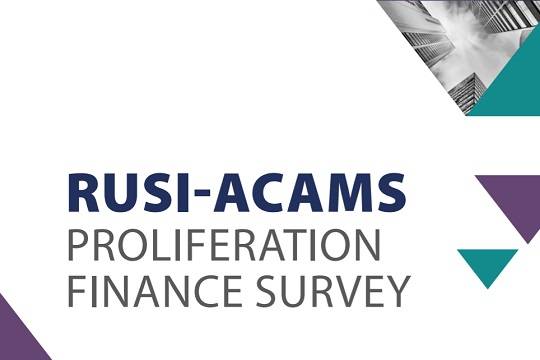Commissioned and undertaken jointly by RUSI and ACAMS in partnership with YouGov, the survey which is based on 366 unique responses from across the global financial industry, shows that international banks are leading efforts in counter- proliferation finance, with local and national banks at greater risk of being exploited by proliferators, such as North Korea.
The survey reveals that US banks are most exposed to proliferation risk from Iran and that few banks consult UN Panel of Experts Reports on North Korea. The study also indicated that international banks are likely to be more familiar with proliferation finance risk than national or regional banks.
Proliferation finance is the financing of weapons of mass destruction and circumvention of sanctions by proliferators, such as North Korea and Iran. RUSI and ACAMS collaborated on the global study in the fourth quarter of 2019 to get insights on attitudes and understanding of proliferation finance.
Survey report
Key findings
- 57% of respondents at international banks report that they are likely to be familiar with proliferation finance risk, compared to 35% in regional banks, 32% in national banks and 35% of non-banking respondents
- 81% respondents think proliferation finance is primarily about the procurement and financing of nuclear, chemical and biological weapons, rather than primarily about the proliferation efforts of specific state actors or non-state groups.
- Respondents based in the USA are least likely to be concerned about detecting payments related to weapons of mass destruction or implementing sanctions against Iran and North Korea, compared to respondents from other regions. Respondents from the USA are also less likely to be aware of and consult proliferation finance red flags, compared to other regions
- Two-thirds of respondents located in national banks agree that money laundering controls will detect most proliferation financing transactions (64%), which is more than double compared to respondents in international banks (31%). 33% of respondents list China as most exposed to proliferation finance risk from North Korea, followed by the United States (20%) and South Korea (10%)
- 21% of respondents list the United States as most exposed to proliferation finance risk from Iran, followed by Russia (10%) and UAE and Turkey (7%)
WRITTEN BY
Emil Dall
RUSI Associate Fellow, CFS
Justine Walker
Head of Global Sanctions and Risk at ACAMS



